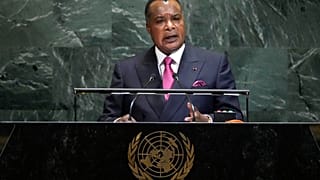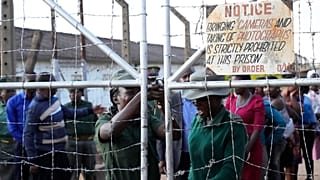AIDS
Years of American-led investment into AIDS programs have reduced the number of people killed by the disease to the lowest levels seen in more than three decades and provided life-saving medicines for some of the world’s most vulnerable.
But in the last six months, the sudden withdrawal of U.S. money has caused a “systemic shock,” U.N. officials warned, adding that if the funding isn’t replaced, it could lead to more than 4 million AIDS-related deaths and 6 million more HIV infections by 2029.
A new UNAIDS report released Thursday said the funding losses have "already destabilized supply chains, led to the closure of health facilities, left thousands of health clinics without staff, set back prevention programs, disrupted HIV testing efforts and forced many community organizations to reduce or halt their HIV activities.”
It also said that it feared other major donors scaled back their support, reversing decades of progress against AIDS worldwide — and that the strong multilateral cooperation is in jeopardy because of wars, geopolitical shifts and climate change.
A ‘lifeline’ removed
The $4 billion that the United States pledged for the global HIV response for 2025 disappeared virtually overnight in January, when U.S. President Donald Trump ordered that all foreign aid be suspended and later moved to close the USAID.
Andrew Hill, an HIV expert at the University of Liverpool who is not connected to the United Nations, said that while Trump is entitled to spend U.S. money as he sees fit, “any responsible government would have given advance warning so countries could plan,” instead of stranding patients in Africa where clinics were closed overnight.
The U.S. President’s Emergency Plan for AIDS Relief, or PEPFAR, was launched in 2003 by U.S. President George W. Bush, the biggest-ever commitment by any country focused on a single disease.
UNAIDS called the program a “lifeline” for countries with high HIV rates, and said that it supported testing for 84.1 million people, treatment for 20.6 million, among other initiatives. According to data from Nigeria, PEPFAR also funded 99.9% of the country’s budget for medicines taken to prevent HIV.
U.N. Assistant Secretary-General Angeli Achrekar, a UNAIDS deputy executive director who was PEPFAR’s principal deputy coordinator until January 2023, said the program is under review by the Trump administration though Secretary of State Marco Rubio issued a waiver “to continue life-saving treatment.”
““The extent to which it will continue in the future, we don’t know,” she told a video news conference with U.N. reporters in New York. “We are cautiously hopeful that PEPFAR will continue to support both prevention and treatment services.”
A gap impossible to fill
In 2024, there were about 630,000 AIDS-related deaths worldwide, per a UNAIDS estimate — the figure has remained about the same since 2022 after peaking at about 2 million deaths in 2004.
Even before the U.S. funding cuts, progress against curbing HIV was uneven. UNAIDS said that half of all new infections are in sub-Saharan Africa.
Tom Ellman of Doctors Without Borders said that while some poorer countries were now moving to fund more of their own HIV programs, it would be impossible to fill the gap left by the U.S.
“There's nothing we can do that will protect these countries from the sudden, vicious withdrawal of support from the U.S.,” said Ellman, head of the group's South Africa medical unit.
Experts also fear another significant loss — data.
The U.S. paid for most HIV surveillance in African countries, including hospital, patient and electronic records, all of which has now abruptly ceased, according to Dr. Chris Beyrer, director of the Global Health Institute at Duke University.
“Without reliable data about how HIV is spreading, it will be incredibly hard to stop it,” he said.











00:57
Tensions escalate as ships attacked in the Strait of Hormuz
01:02
Iran fires back at Israel, U.S. bases after attacks
01:11
South Africa: U.S. aims to process 4,500 refugee applications each month
00:05
'I did not know Jeffrey Epstein,' Hillary Clinton tells congressional committee
01:48
Iran warns US: choose 'table of diplomacy' or face 'firm blow'
01:40
Trump paints rosy picture of US in record-long State of the Union speech